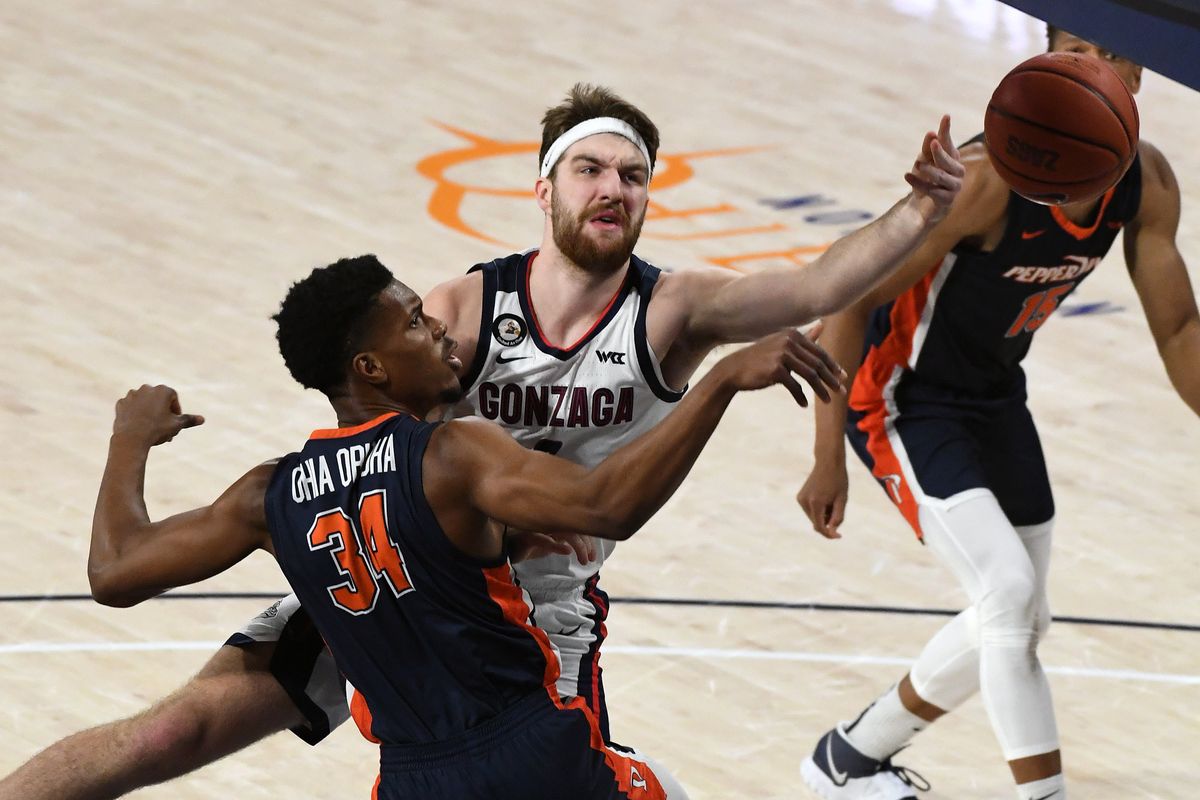TV Take: Gonzaga gets ‘remarkable’ reviews in tougher-than-expected test from Pepperdine

Jay Bilas has a law degree. He still is a member of a Charlotte, North Carolina, law firm. He also, as most college basketball fans know, played at Duke.
So if you need someone to make a case for your hoops program, Bilas is probably the right guy.
Not that Gonzaga needs a barrister to argue their bona fides, not even after the Zags’ tougher-than-expected 95-70 West Coast Conference victory Thursday night over a well-rested Pepperdine team.
But Bilas, from his remote location, made quite a statement to play-by-play voice Dan Shulman and those watching ESPN’s broadcast from the McCarthey Athletic Center.
What they saw …
• As the Bulldogs, who led by four at halftime, were starting to pull away in the second half, the announcing duo began discussing Gonzaga’s historical relevance. You know, the rags-to-riches tale to national prominence that has been documented over and over the past two decades.
But Bilas made a case for even more. A lot more.
“It is,” the longtime analyst said of Gonzaga’s two decades of achievement, “one of the greatest success stories, I think, in American sports history.”
Now that’s a statement.
But Bilas, who graduated from Duke’s law school in 1992, made his argument by making the Gonzaga deniers case for them. He conceded the relative weakness of the WCC, saying it is easier to make the NCAA Tournament from a small conference than, say, the Big Ten. Then he slayed that straw man.
“But show me who has done that in other small conferences,” he said, emotion in his voice. “There are 25 small conferences. But who has done it? And the answer is nobody has done what Gonzaga has done at this level for this period of time.
“It’s absolutely remarkable.”
• Speaking of time, Pepperdine (4-6) hadn’t played a game in 23 days, since losing to Cal State Bakersfield 79-51 two days before Christmas. Heck, the Waves had yet to play a conference game.
But for most of the first half, it was Gonzaga that looked like it had been sitting for a while.
When intermission hit, just after a buzzer-beating 3-pointer by the Waves’ Daryl Polk Jr., they were within 43-39. And that was despite the Bulldogs (13-0, 4-0) doing exactly what Bilas said they had to do to win: keep Colbey Ross from having a great game.
The Waves’ senior point guard was saddled with foul trouble. He sat for long periods before the half. He never really got going and finished with just nine points, 10 under his average.
And yet the Waves were shooting 50 percent from the floor and was stifling the Zags’ running game, leading 7-6 in transition points as they teams headed to their locker rooms.
It didn’t last.

What we saw …
• Did you know Jalen Suggs has a football pedigree? That’s a rhetorical question, of course, because anyone in the Inland Northwest with a passing acquaintance with the Zags knows about Suggs’ past on the gridiron. And yet, every time ESPN broadcasts a Gonzaga game, the network has to build some type of package around Suggs’ days as Mr. Football in Minnesota.
At least the Worldwide Leader was able to run down some interesting photographs of the days when Suggs looked, actually, somewhat thin in his pads.
Hopefully, though, ESPN will retire the obligatory “did you know” aspect of the freshman’s high school football career.
• It’s obvious that Sean Farnham is the network’s West Coast Conference expert. With the Zags’ thin four-point halftime lead, the studio cast turned to Farnham for some sort of explanation. He had one, calling Pepperdine probably the best-equipped team in the conference, with Ross and Kessler Edwards, to give Gonzaga this type of challenge.
• It took a while to get used to the sound mix on the broadcast.
Shulman and Bilas, broadcasting remotely, were quite loud, but it seemed necessary. There was some overpowering background noise, a little tinny in nature, which had to be overcome.
• The better the competition, usually the better the officials assigned to the game. With this one expected to be a rout, that truism was in play – the wrong way.
The three officials in the Kennel in this one, Rick O’Neill, Frank Harvey and Marc Beasley, seemed a little overmatched.
A 70-second stretch in the second half illustrated this.
Suggs, who battled foul trouble all game, was trying to avoid a fourth less than 2 minutes into the half. He attempted to take a charge and fell with little contact – a constant occurrence throughout the game. When Corey Kispert grabbed the rebound after the ensuing shot and started a break, a whistle sounded.
Harvey had stopped the action to issue a warning to Suggs for flopping.
On the next Pepperdine possession, Joel Ayayi tried to beat Ross over a screen. Another whistle blew. This time it was O’Neill blowing his whistle. But Ayayi immediately complained that he was hooked, which was a point of emphasis last year.
As the officials watched video, ESPN showed enough angles to show, yes, Ayayi was hooked by Ross. But, as Bilas pointed out during the interminable replay review, it was hard to tell if the hook came before the whistled foul.
So the call stood after what Bilas called “a ridiculously amount of time.”
By the way, on the next Gonzaga possession, Andrew Nembhard drove. A Pepperdine player flopped to the floor. A whistle blew. A warning? Nope. O’Neill had called a charge.
As Bilas said later on another awful fall-to-the-floor call, “everybody who falls down gets a charge.”
That’s an argument he’ll probably win.